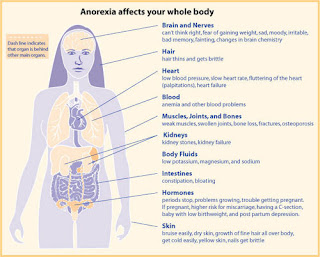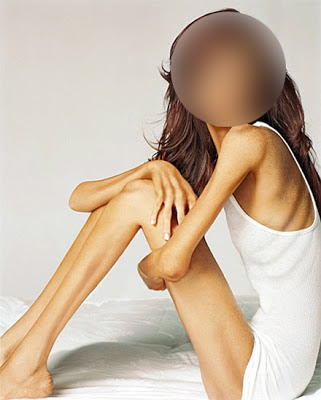A treatment program for anorexia nervosa is weight recovery priority , many of altered thoughts about food, weight or shape are supported by malnutrition.
The normalization of the diet and eating habits are a key step in the therapeutic process. Second is to solve psychological problems, family or social concurring in anorexia nervosa.
Weight recovery
Nutritional rehabilitation and dietary normalization corrects the physical and psychological that perpetuates malnutrition, these psychological scars take a long time to return after having the weight recovery, this should be the initial goal of treatment of anorexia nervosa.
Dietary Treatment
Is varied opinion on whether the feedback should be based on a normal caloric content either reset from low-calorie diets, different authors do not agree, if you start in a normal diet or gradually increase the amount calories. Despite the apparent risk of a caloric value feedback normal, in practice no complications often occur, particularly if it has been properly evaluated.
Not so with nasogastric feeding and parenteral which should be extremely cautious and this method should never be the remedy to the lack of staff, or as a solution to a patient's medical excessively hiding, throw, or put feeding difficulties.
Is very different than in the dietary management program include tube feeding as negative reinforcement against a specific attitudes of food refusal, in such cases the probe may be recommended, but only applied in a timely manner, in a program concerted and never leave permanent than a comfort and a therapeutic resource itself .
Psychological treatment
Psychological treatment is the cornerstone of a good treatment program for anorexia nervosa. It is well known that psychotherapeutic interventions are ineffective in more severe stages of the disease, patients are malnourished and underweight are extremely refractory to psychotherapy and cognitive changes hardly observed until they recovered certain weight .
In this sense, supportive psychotherapy, relaxation techniques and psychoeducational sessions facilitate the patient does not see as overly coercive behavioral program giving a view that is only entered to gain weight.
Therapy cognitive behavior has emerged in the last decade as the most effective in the treatment of anorexia nervosa and controlled studies showing efficacy.
For the behavioral model of anorexia nervosa would be a set of behaviors reinforced by environmental factors that gratify the thinness, and aversive stimuli triggers anxiety, not anorexic eat to avoid the anxiety it provokes thought in weight gain.
Pharmacotherapy
Drug therapy in anorexia nervosa is indicated as adjunctive techniques such as behavior modification and treatment of associated psychopathology, especially depression.
With a more specific action on appetite using cyproheptadine, an antihistamine orexigenic especially useful in restrictive anorexia, much less in the purgative.
Wider dissemination of antidepressants have been both amitriptyline and clomipramine seems effective in anorexia nervosa especially when it has found the existence of associated depression. The side effects of tricyclic antidepressants are the major drawbacks except the weight gain associated with their use
Modern selective inhibitors of serotonin reuptake have been used in the treatment of anorexia nervosa.
Family Therapy
Although initially supported the family away from the treatment of anorexic girls, was progressively involving the family in treatment programs, both in outpatient and inpatient.
Treatment regimen
For the choice of treatment regimen, hospitalization, day hospital or outpatient treatment, we must be guided not only by the weight and physical health of the patient, other indices that will help us make a clinical decision often transcendental. Although the program is also required outpatient intervention program and well structured complex that includes the three areas of intervention: the weight, shape and cognitions . You need a food monitoring program to ensure a diet can reverse the malnutrition and provide psychotherapeutic intervention.
The family must have complete information of the pathology, physical complications and risks of certain behaviors of patients, not only of the need for treatment but also what is the most correct and what is the most effective model . Another aspect to be evaluated by the patient's own family and treatment costs are not only financial costs: although social insurance own expense, in this pathology are other costs: the patient may need to study or work temporarily sacrifice and family to monitor and control their behaviors related to food should organize and organized differently.
Treatment in hospital
In patients with low motivation, psychological instability, associated psychiatric disorder and an uncooperative family atmosphere, you should login, and forced to losses of 25 to 30% by weight at the time appropriate for age and height.
Therapeutic intervention on an anorexic patient needs inpatient treatment program thorough and demanding, shared and accepted by all the people who treat these sick. This equipment must be multidisciplinary, comprising physicians, psychologists, nurses and auxiliary write down with a special emphasis is essential training and skills of all staff for the treatment of these pathologies, especially nursing, without whose help is very difficult to raise a treatment in hospital. This staff psychiatrists and psychologists should form it, advise and monitor it through continuing education programs.





this is helpfull. thank you
ReplyDelete